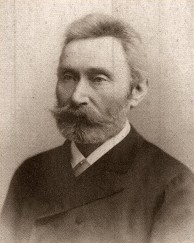This article needs additional citations for verification. (September 2023) |
Antonín Bennewitz (also Anton Bennewitz; 26 March 1833 – 29 May 1926) was a Bohemian violinist, conductor, and teacher. He was in a line of violinists that extended back to Giovanni Battista Viotti, and forward to Jan Kubelík and Wolfgang Schneiderhan.[1]
Antonín Bennewitz | |
|---|---|
 Bennewitz in 1920 | |
| Background information | |
| Birth name | Antonín Josef Václav Benevic |
| Born | 26 March 1833 Přívrat, Bohemia |
| Died | 29 May 1926 (aged 93) Doksy, Czechoslovakia |
| Genres | Classical |
| Occupations |
|
| Instrument | Violin |
Life and career
editHe was born in Přívrat, Bohemia, as Antonín Josef Václav Benevic (his name is most often seen in the German rendering—Bennewitz) to a German father and a Czech mother. He studied under Moritz Mildner (Мильднер, Мориц) (Mořic Mildner: 1812–1865) at the Prague Conservatory from 1846 to 1852. He was subsequently engaged as first violinist at the Estates Theatre in Prague (1852–1861),[2] as well as in Salzburg and Stuttgart.
On 3 December 1855, he participated in the first performance of Bedřich Smetana's Piano Trio in G minor, Op. 15, at the Prague Konvict Hall, with Smetana himself as pianist and Julius Goltermann as cellist.[3] In 1859, he performed in Paris and Brussels.[2]
In 1866, he became professor of violin in Prague.[citation needed] In 1876, he succeeded Mildner as leader of the Friedrich Pixis (Bedřich Vilém Pixis) quartet, which became known as the Bennewitz Quartet.[citation needed] He became director of the Prague Conservatory in 1882, serving until 1901, when he was succeeded by Antonín Dvořák. He was among the founders of the Kammermusikverein, whose nationalist ideals stimulated Smetana to write his String Quartet in E minor, From My Life.[4]
On 25 February 1895, Bennewitz conducted the first complete performance of Josef Suk's Serenade for Strings in E flat, Op. 6, with the Prague Conservatory orchestra (two movements had been heard 14 months earlier, conducted by Suk himself).[5]
On 3 June 1896, at the Prague Conservatory, Bennewitz conducted the first (semi-public) performances of Dvořák's symphonic poems The Noon Witch, The Water Goblin, and The Golden Spinning Wheel.[6]
Bennewitz died on 29 May 1926, at the age of 93, in Doksy, where he is buried.
Legacy
editIn 1998, a new Bennewitz Quartet, named in the musician's honour, was founded in Prague.[7]
Students
editBennewitz's pupils included František Ondříček (who premiered the Dvořák's violin concerto), Karel Halíř (who premiered the revised version of the Sibelius violin concerto), Otakar Ševčík, Franz Lehár, and three members of the Bohemian Quartet (later known as the Czech Quartet)[8]—Karel Hoffmann and Josef Suk (violinists), and Oskar Nedbal (violist).[citation needed]
References
edit- ^ Otakar Sevcik: The Enduring Legacy Archived 22 July 2011 at the Wayback Machine
- ^ a b Černušák, Gracián; Štědroň, Bohumír; Nováček, Zdenko, eds. (1963). Československý hudební slovník I. A-L (in Czech). Prague: Státní hudební vydavatelství. p. 83.
- ^ Sierra Chamber Society Program Notes Archived 26 February 2009 at the Wayback Machine, fuguemasters.com; accessed 10 February 2018.
- ^ M1 Robin Stowell, The Cambridge Companion to the String Quartet
- ^ "Serenade for Strings", Answers.com; accessed 10 February 2018.
- ^ Prague Symphony Orchestra Archived 25 September 2008 at the Wayback Machine
- ^ Bennewitz Quartet official biography Archived 5 April 2012 at the Wayback Machine, bennewitzquartet.com; accessed 10 February 2018.
- ^ "Hanuš Wihan". Archived from the original on 29 October 2013. Retrieved 23 November 2008.
Sources
edit- Grove's Dictionary of Music and Musicians, 5th ed.
External links
edit- Media related to Antonín Bennewitz at Wikimedia Commons